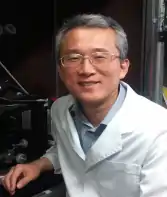Eunjoon Kim | |
|---|---|
 | |
| Born | Jan 20, 1964 |
| Nationality | Korean |
| Alma mater | Busan National University, KAIST, Michigan State University |
| Awards | Asan Award in Medicine |
| Scientific career | |
| Fields | Neuroscience, autism, protein receptors |
| Institutions | KAIST, Institute for Basic Science, Harvard Medical School |
| Doctoral advisor | James L. Bennett |
| Korean name | |
| Hangul | |
| Revised Romanization | Gim Eunjun |
| McCune–Reischauer | Kim Ŭnchun |
| Website | IBS Center for Synaptic Brain Dysfunctions |
Eunjoon Kim is a professor of KAIST and director of Center for Synaptic Brain Dysfunctions within the Institute for Basic Science (IBS). His current research focuses on molecular mechanisms underlying autism spectrum disorders and synaptic brain dysfunctions. With over 200 publications to his name, his research has been cited over 27,000 times giving him an h-index of 81.[1] He graduated from Busan National University in 1986, received master's degree at KAIST in 1988, received PhD degree at Michigan State University in 1994, and worked at Harvard Medical School as a postdoctoral fellow during 1995-1996. His current research focuses on molecular organization of neuronal synapses and synapse dysfunction-related psychiatric disorders.
Education
- 1982. 3 – 1986. 2 B.S., Dept of Pharmacology, Busan National University, Korea
- 1986. 3 – 1988. 2 M.S., Dept of Biological Engineering, Korea Advanced Institute of Science and Technology (KAIST), Korea
- 1991. 9 – 1994. 12 Ph.D., Dept of Pharmacology and Toxicology, Michigan State University[2]
Work
- 1988. 3 – 1991. 8 Research Associate, Korea Research Institute of Bioscience and Biotechnology, Daejeon, Korea
- 1995. 1 – 1997. 2 Postdoc, Dept of Neurobiology and Howard Hughes Medical Institute, Harvard Medical School.P.I.: Morgan Sheng
- 1997. 3 – 2000. 2 Assistant Professor, Dept of Pharmacology, Busan National University, Korea
- 2000. 3 – 2014 Assistant, Associate, & Full Professor, Dept of Biol. Sci., KAIST, Korea
- 2003. 7 – 2012.5 Director, National Creative Research Initiative Center for Synaptogenesis, Korea
- 2012. 6 – present Director, Center for Synaptic Brain Dysfunctions, Institute for Basic Science, KAIST, Korea[3]
Awards

Participants of Asian Science Camp 2022 having discussion with Eunjoon Kim.
- 2018: Asan Award in Medicine, ASAN Foundation[4][5][6]
- 2014: KAISTian of the Year, KAIST[7]
- 2013: POSCO TJ Park Prize, POSCO TJ Park Foundation[8][9][10]
- 2012: Life Science Award, Korean Society for Molecular Cell Biology[11][12]
- 2012: Inchon Award, Dong-A Ilbo[13][14]
- 2012: Life Science Award, Korean Society for Molecular and Cell Biology
- 2011: Best Research Award, KAIST[15]
- 2005: BPS Award, Korean BioPharmacal Society
- 2004: Young Scientist Award, Korean Academy of Science and Technology[16]
- 2003: Academic Award, KAIST
- 1991: Korean Government Overseas Scholarship, Ministry of Education
Selected publications
- Kim, Eunjoon; Sheng, Morgan (1 October 2004). "PDZ domain proteins of synapses". Nature Reviews Neuroscience. 5 (10): 771–781. doi:10.1038/nrn1517. Retrieved 1 November 2023.
- Doyle, Declan A.; Lee, Alice; Lewis, John; Kim, Eunjoon; Sheng, Morgan; MacKinnon, Roderick (28 June 1996). "Crystal structures of a complexed and peptide-free membrane protein–binding domain: molecular basis of peptide recognition by PDZ". Cell. Elsevier. 85 (7): 1067–1076. doi:10.1016/S0092-8674(00)81307-0. Retrieved 1 November 2023.
- Kim, Eunjoon; Niethammer, Martin; Rothschild, Adam; Jan, Yuh Nung; Sheng, Morgan (2 November 1995). "Clustering of Shaker-type K+ channels by interaction with a family of membrane-associated guanylate kinases". Nature. Nature Publishing Group UK. 378 (6552): 85–88. doi:10.1038/378085a0. Retrieved 1 November 2023.
- Naisbitt, Scott; Kim, Eunjoon; Tu, Jian Cheng; Xiao, Bo; Sala, Carlo; Valtschanoff, Juli; Weinberg, Richard J.; Worley, Paul F.; Sheng, Morgan (1 July 1997). "Shank, a novel family of postsynaptic density proteins that binds to the NMDA receptor/PSD-95/GKAP complex and cortactin" (PDF). Neuron. Elsevier. 23 (3): 569–582. Retrieved 1 November 2023.
- Niethammer, Martin; Kim, Eunjoon; Sheng, Morgan. "Interaction between the C terminus of NMDA receptor subunits and multiple members of the PSD-95 family of membrane-associated guanylate kinases". Journal of Neuroscience. Society for Neuroscience. 16 (7): 2157–2163. doi:10.1523/JNEUROSCI.16-07-02157.1996. PMC 6578538. Retrieved 1 November 2023.
See also
References
- ↑ Eunjoon, Kim. "Google Scholar". Google Scholar.
- ↑ Kim, Eunjoon. "Michigan State University".
- ↑ "2008 - 2018 Laureates Asan Award in Medicine - Asan Medical Center". Asan Award in Medicine. Asan Foundation. Retrieved 5 September 2018.
- ↑ Kim, Hyoyeon (11 April 2018). "The 11th Asan Award in Medicine Laureates". KAIST Herald. KAIST. Retrieved 5 September 2018.
- ↑ "Four Scientists to Receive 2018 ASAN Awards". Asian Scientist. 30 January 2018. Retrieved 5 September 2018.
- ↑ "Synaptic Brain Dysfunctions Lab". Synaptic Brain Dysfunctions Lab. KAIST. Retrieved 5 September 2018.
- ↑ "POSCO Announced 2013 POSCO TJ Park Prize Winners". Oreanda News. 18 February 2013. Retrieved 23 November 2023.
- ↑ "Science Prize Awardees(2013): Eun-jun Kim". TJ Park Foundation. POSCO. Retrieved 5 September 2018.
- ↑ 박, 민규 (5 February 2013). "포스코 청암상에 김은준·윤병훈·서영남 씨 선정". 아시아경제 (in Korean). Retrieved 5 September 2018.
- ↑ 박, 혜정 (10 January 2018). "아산의학상에 김은준·방영주 교수 선정". 아시아경제 (in Korean). Retrieved 5 September 2018.
- ↑ 이, 에스더 (11 January 2018). "아산의학상에 김은준·방영주 교수". JoongAng Ilbo (in Korean). Retrieved 5 September 2018.
- ↑ 황, 인찬 (30 August 2012). "[제26회 인촌상 수상자]인촌상 영광의 얼굴들… 수상소감과 공적". DongA (in Korean). Retrieved 5 September 2018.
- ↑ "인촌상 김은준 교수". Naver (in Korean). Yonhap News. 29 August 2018. Retrieved 5 September 2018.
- ↑ 김, 봉구 (5 January 2015). "'올해의 KAIST인 賞' 김은준 교수 … 시냅스 단백질 연구". 한국경제 (in Korean). 한국경제신문. Retrieved 5 September 2018.
- ↑ "과학계 신인상 받은 '젊은과학자상 수상자들'…20년 만에 주역으로 우뚝". Korean Academy of Science and Technology (in Korean). 10 August 2016. Retrieved 21 August 2020.
External links
This article is issued from Wikipedia. The text is licensed under Creative Commons - Attribution - Sharealike. Additional terms may apply for the media files.